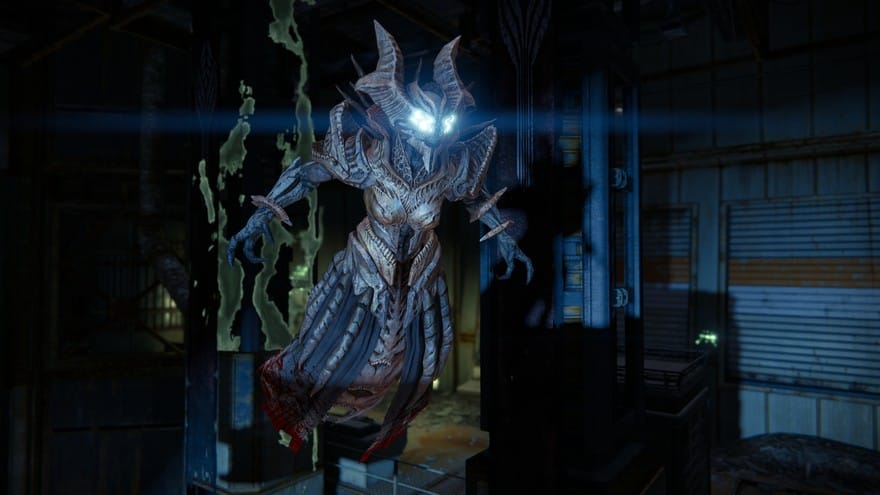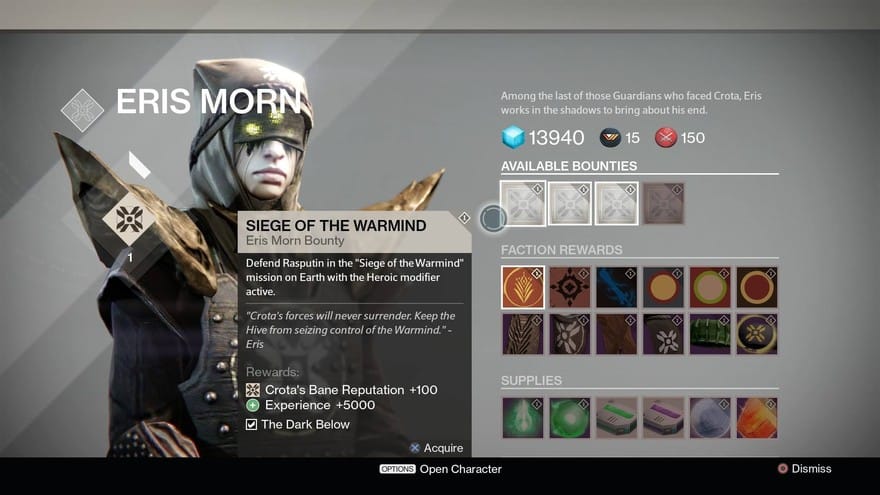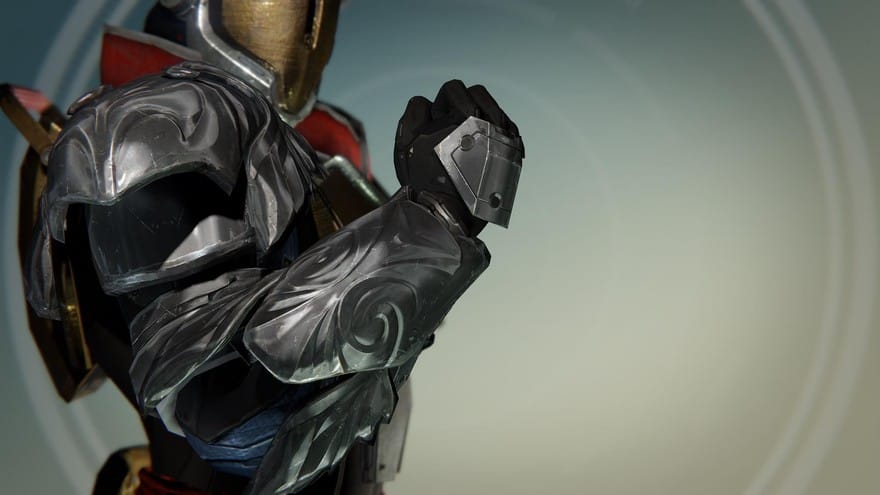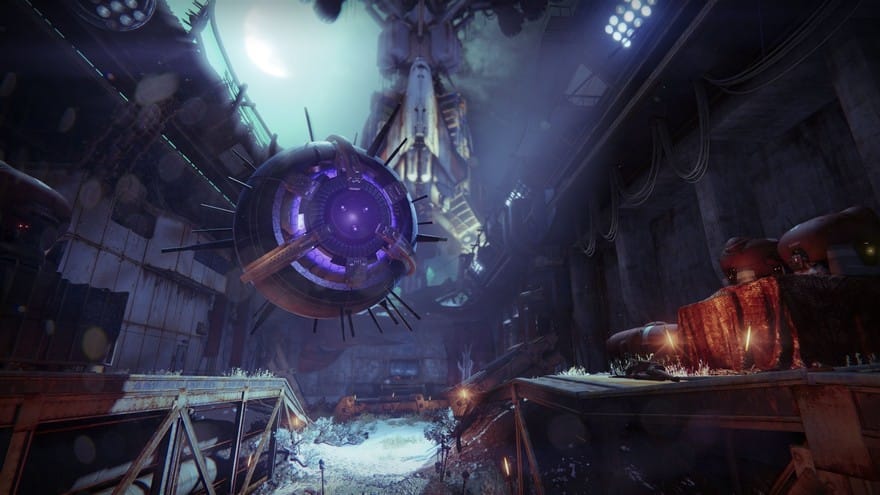We are slaves to Destiny

It’s a matter of self-improvement. Each day you collect your tasks, every one itemized for your convenience, and organize their alignment. Planning an efficient path through this daily to-do is the key to success, along with managing both your short-term and long term goals. Of course, currencies are open to manipulation and fluctuation, so calculating how to maximise their potential is a basic requirement. Keeping one eye on the update schedule is also worthwhile, as predicting changes in the market can be entirely profitable. Playing the system, if you are quick to uncover exploits, is not out of the question. Finally, you must remember to be efficient, effective and, above all, enterprising.
Such is the life of one of Destiny’s Guardians. Each one carries a long shopping list, to-do list and to-get list that dictates her actions within the brightly hued science fiction world. Bounties to complete, daily challenges to best, currencies to collect and upgrades to unlock—all form a set of closely interwoven loops that fill these lists, all pushing towards a nebulous and ever-receding goal. Now, with the addition of the game’s first expansion, The Dark Below, these lists have become longer. The central element of the expansion is Eris Morn, a new vendor who has set up in the hub of the tower, ready to portion out quests, items and bounties to eager players. Unlike a usual RPG quest-giver, she is in fact a dressed-up shop front, a way to jam extra currencies, experience bars and progression systems into Destiny’s already convoluted design. She is also something of a portent, a sign of how Bungie and Activision see Destiny proceeding into its starry-eyed future. That future is entirely based on an ornate relationship between the game and the player, one that treats the latter as an idealized example of the neo-liberal subject.
///

“Neo-liberalism is precisely the deployment of the logic of the market as a generalized normative logic, from the state to innermost subjectivity.”
~Pierre Dardot and Christian Laval, The New Way of the World: On Neoliberal Society
Financial neo-liberalism—the deregulation of banks and financial markets for the benefit of society—has been around for more than half a century. Perhaps epitomized by the governmental attitudes that led to the global recession of 2008, its belief in the free market and private enterprise as the basis for political structures has been widely discussed. However, the impact of neo-liberalism on society stretches far beyond economic and financial structures. The logic of the market, where enterprise and efficiency form the ruling philosophies, has seeped into every element of the modern liberal democracy. Such is the position Pierre Dardot and Christian Laval take in their book The New Way of the World. For them the neo-liberal is not simply financial doctrine, but a vision of society and government as a web of market-based relations.
Central to this position is the transformation of members of the society into neo-liberal subjects, each one representing an “enterprise within enterprises.” In our neo-liberal societies, each person is their own project, brand and enterprise, existing in a series of contractualised relationships that are governed by the logic of self-improvement. It is up to us to make ourselves better, we are told, the system simply supplies us with the appropriate tools to use—tasks to undertake and ladders to climb so that we may realise our potential.
///

“Guardian, I need your help. Crota will return to destroy this world if we do not stop him.” Eris’s plea is little more than background noise as you collect the day’s set of tasks. Most of them requiring careful calculation before attempting. Herding lower-level enemies into tight groups that you can kill with a specific weapon in a specific amount of time is easy enough if you know where to look. You, of course, know where to look: The enemies in question are as predictable as tickboxes, appearing in the same formations again and again on an endless series of checklists. You cast your eye over your reputation rank, make a few quick calculations, then begin the first step towards the new you.
It’s not hard to see how The Dark Below is an actualization of neo-liberal principles in a virtual world. The logic of the market is the logic of Destiny. As a Guardian you are engaged in the task of self-improvement. Whether through chasing the gear-gated levelling system, the hard-to-get exotic weapons or the more ambiguous rewards that come with faction reputation, all of your actions are dictated by a self-motivated drive for improvement. The implementation of this process comes from the careful management of pleasure and pain. Each act in Destiny is a calculation: How much pain (otherwise known as grind) is required for me to achieve pleasure (generally represented in the form of loot)? This mirrors the structure of work and pleasure that is so central to processes of subjugation that Dardot and Laval highlight in their work. The fact that in Destiny this situation is “naturalized,” so that the arbitrary requirements placed on the player seem to stem from some kind of universal law or fairness, only strengthens this connection. This structure is not unique to Destiny, existing in many grind-heavy RPGs, yet its implementation in Destiny, and in particular The Dark Below, develops this idea further along the neo-liberal axis drawn out by Dardot and Laval.
The game’s vendor system lies at the center of this structure. In Destiny almost every non-player character you interact with has a reputation system. Complete tasks while representing this vendor and your will gain reputation; gain reputation and you gain access to better items. Despite the apparent context of being one of the last defenders of humanity in a universe where all must band together for the good of the species, every interaction you have is based on a contractual agreement.
Dardot and Laval see this as being a central element of neo-liberal society, where the basic form of human relationship is the contract. This neo-liberal dogma, it seems, can survive the near extinction of our species. Eris, and her addition in The Dark Below, is a perfect example of Bungie’s commitment to this. She comes to ask the player’s help, and yet subjects players to an arbitrary series of quantified tasks (gaining reputation, killing 25 enemies, etc.) before she will give them the tools to allow them to complete this task. In many ways this mirrors the situation the neo-liberal subject finds herself in everyday, where she is asked to help improve society through her own self-improvement, and yet is constantly denied access to that which she requires to make this step. Instead she is asked to “earn” the right to self-fulfillment, through the restricted actions made available to her, a sisyphean task that locks her into a destructive and subjugating position.
///

“It might be said that the first commandment of the entrepreneur’s ethics is ‘help thyself.’”
~Pierre Dardot and Christian Laval, The New Way of the World: On Neoliberal Society
In The Way of the World Dardot and Laval also explain how neo-liberal society uses the concept of self-improvement to expose the individual to risk. Through a drive to shrink the state and prioritize the rights of private enterprise, governments reduce the rights of the individual, placing more pressure on citizens to “help themselves.” We see this when taxpayers bail out banks, when failing financial systems lead to public services such as health and education being cut, and and when blame is placed on minority members of the society (immigrants, those who claim benefits) for financial difficulties. The subject is no longer shielded from the turbulence of financial markets—instead she is directly implicated in them.
In Destiny’s various updates, including patches and adjustments, as well as the more significant Dark Below, Bungie and Activision have succeeded in creating a simulation of this same sense of risk. Since release, there have been adjustments to the game’s economy that have fundamentally changed the way in which it functions. These improvements seemed to be positive steps towards a “fairer” system; however, with the release of The Dark Below, it has become clear that they are much more cynical acts. In a bizarre shift, previously low-worth items have become central parts of a new upgrade system. Meanwhile, new currencies have been added to restrict the access to legendary armour, and exotic weapons now must be upgraded again from scratch with thousands of exp if players wish their damage to scale with the new enemies and levels. In many ways The Dark Below, and Destiny’s other updates, have exposed the player directly to risk, by showing that the value of the items in their possession and their time committed to the game is highly transient. Knowing about potential changes to the game as early as possible has become as much of a gameplay feature as planning your daily bounties or earning your weekly share of currency.
The most important effect of this is one highlighted by Dardot and Laval. They explain that by transferring risk to employees, companies are able to demand a higher level of of flexibility and commitment from them. When combined with an emphasis on self-improvement, the increased exposure of the individual to risk creates a situation where it is up to the individual to adapt, self-govern and impose new rules on herself. In the same way, The Dark Below introduces changes to Destiny that result in a higher level of commitment from players. The cynical adjustment of the economy is not providing players with new things to do; instead, it is an extension of the same processes that they were already implicated in. Like the employer that reduces a workforce without reducing the workload, The Dark Below is enforcing difficulty and instability on the player as a method of further increasing their time commitment and mental involvement with the game. What appears to be shoddy planning is in fact a highly exploitative piece of system design. Yet The Dark Below also steps beyond even this, implementing a neo-liberal regime in Destiny that specifically re-imagines the idea of “content.”
///
Playing one of a handful of new levels in The Dark Below is like renting a flat. It seems nice enough, you think to yourself, but would I really want to spend six months here? After all, at this point you have assassinated a hundred Fallen Warlords, survived a thousand waves of screaming Hive and defended robotic Peter Dinklage while he hacks into a computer more times than you can count. So many times, in fact, that the defense of humanity, the assault on the forces of darkness and every other plot point has faded into non-existence. Levels are now defined by their topology—the length of the floaty jumps, or the rhythm of chunky headshots marking out their terrain like an incredibly violent version of statistical analysis. I can shave off a few seconds by cutting this corner, you think, the enemies just a plasma spitting distraction to your line of best fit.
The Dark Below is entirely structured around the idea of enterprise as content.
The choice to name The Dark Below an “expansion pack” seems to be a distinctly symbolic act. This term, plucked from the history of PC gaming, nicely chimes with the kind of corporate language favoured by neo-liberal institutions. “Expansion of business” or “expanding markets” both indicate the application of market logic to the world. But, more importantly, this careful titling dodges the usual DLC label, meaning The Dark Below stays away from the word “content” as far as it possibly can. This is because, unlike in the traditional videogame paradigm, where locations, characters and items equal content, The Dark Below is entirely structured around the idea of enterprise as content. Putting aside any arguments of “value for money” that usually come up around DLC (market logic states, after all, that the value of something is equal to the price at which it is able to be sold), this expansion is notable for its focus on timed events, awkward requirements, and numerical tasks. This long to-do list, which piggy-backs onto the already extensive to-do list given to you by the main game, is how the majority of players will spend their time interacting with The Dark Below. The Strike, Raid and Story missions included are simply part of this, not set-up to be impressive one-time experiences, but instead designed to be repeated to the point where they become extensions of the game’s daily tasks. This is an aspect that uniquely unites The Dark Below with neo-liberal regimes, beyond any other game.
In this way, The Dark Below seems to centralize a symbolic exchange of reward for labour, but in reality treats labour as a product in itself. The repetition of tasks, activities and missions is presented to the player as the lone way to achieve rewards, and yet within the constructed system of randomness and uncertainty that the game offers, these rewards are never certain. This is how it presents the enterprise of self-improvement as content in itself. Through this The Dark Below treats the player as the epitome of Dardot and Laval’s neo-liberal subject, an individual engaged in global competition, pursuing self-improvement through the completion of repetitive, meaningless tasks with obscured rewards. The product of this process is not the achievement of further power in the form of a higher level, more powerful weapons or better equipment, as this task will forever be receding from the player. The product of the relationship between the player and the game is in fact the investment of time or work in the process itself. As an expansion The Dark Below is exactly what is appears to be: an expansion of the endless loop of work that Destiny already presents, an enterprise within a network of enterprises.
///

“Oscillating between depression and perversion, neo-subjects are condemned to a double life: a master of performance to be admired and an object of enjoyment to be disposed of.”
~Pierre Dardot and Christian Laval, The New Way of the World: On Neoliberal Society
The processes I have presented so far are important systems to be aware of both in virtual and real worlds. But the most troubling aspect of these processes is not their implementation, but their effect. For many of us, the effect of neo-liberal regimes on the individual subject is a familiar one. We have all experienced the highs and lows of living within a system that presents self-fulfilling, limitless consumption as achievable through the contradictory process of self-negating, servile obedience. The experience of playing The Dark Below is not equal to this daily struggle, but its effect is surprisingly similar. The internet is home to more angry rants of Destiny players than you could count. As with many other MMOs, players swear to quit the game forever, threaten to delete their accounts, and yet, within days, are logging back in. On their return, the draw of productive work, potential rewards and familiarity restores their relationship to the game. These particular players don’t represent every user on any given MMO, but are an extreme example of the relationship between player and game. Like the relationship of the neo-liberal subject to the system, this interaction is a constant shift between disappointment and excitement.
What is so distinct about The Dark Below is the way it systemizes this relationship. Through its emphasis on contractual relations, the exposure of the player to risk and transience, and its treatment of work as content, The Dark Below, and Destiny in a wider sense, specifically exploits the player’s relationship to its systems. Like the processes of neo-liberalism that have clearly, through intentional design or not, been the inspiration for its various systems, Destiny asks one thing of players—that they are more productive. Through both reward and limitation, the game is constantly encouraging the player to commit more work and time to its processes, demanding constant attention. If the player is unwilling to offer this then she is subject to the shifting economies of the game’s system, where updates such as The Dark Below alter the value of work already committed. Yet, ironically, the player who commits more time and effort is no more protected from these changes, as the system may change at any point, negating their investment. It is true that Destiny is a reflection of the values of our times, and perhaps in that way it should not be blamed fully for mirroring that which is around it. Yet the kind of systems it presents are both depressingly recognisable, and politically pertinent. The Dark Below’s greatest crime is its complete and utter acceptance and preservation of these inhuman politics. It is enough that we have to live in a society where subjugation is inevitable—that we are expected to play in the same context is inexcusable.



